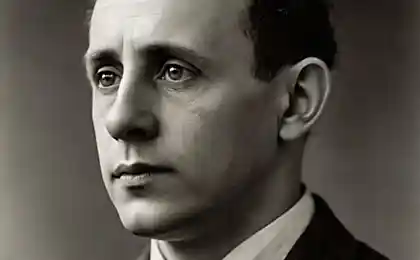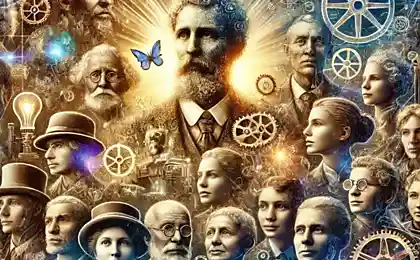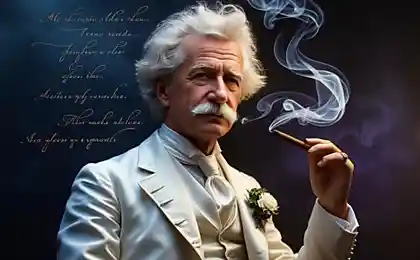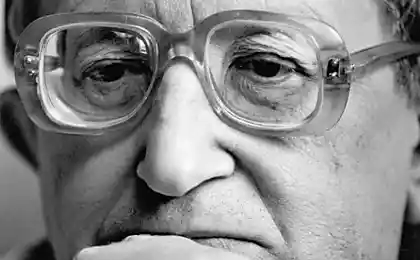825
17 well-known phrases that are taken out of context

These phrases all of us know and are constantly used in everyday speech. But is our favorite quotes is the same as that now? Here are a few examples of how much can distort the meaning of statements, if time does not consult with the original.
1. dead or good or anything.
"On the dead or good, or nothing but the truth," - saying of the ancient Greek politician and poet Chilo of Sparta [VI in. BC. e.], cited by the historian Diogenes Laertius [III in. n. e.] in his essay "Life, the teaching and the views of renowned philosophers."
2. Love for all ages.
Quoted from "Eugene Onegin", which is often used, explaining the passionate feelings of people in the years or with a big age difference. However, you should read the verse as a whole, it becomes clear that Alexander had in mind not at all:
Love for all ages;
But the young, virginal hearts
Her impulses are beneficial,
As the storm springtime fields:
The rain passions they svezheyut,
And updated and are maturing -
And life is being able to give
And lush color and sweet fruit.
But in the age of late and fruitless,
At the turn of our years,
Sad passions blind trail:
So cold autumn storm
In swamp meadow pay
And bare wood around.
3. You live - and learn.
Very well-known phrase, which can be heard from virtually every teacher and that like to cite as an argument to justify the importance of the study of a particular subject matter, but in reality is incomplete and often wrongly attributed to Lenin.
The author of the original phrase - Seneca, and it sounds like this: "You live - and learn how to live."
4. The people are silent.
The famous "people remain silent" is considered to be a way acquiescence of the Russian people, ready to accept any decision of the authorities and any power at all. However, Pushkin - exactly the opposite. The poem ends with the fact that after the massacre of Godunov's people are the new king.
"Mosalsk: People! Maria Godunov and her son Theodore poisoned himself with poison. We saw them dead corpses. People terrified silence.
Mosalsk: Why are you silent? shout: Long live the king Dmitri Ivanovich!
The people are silent. "
5. The end justifies the means.
The full version of phrases written by the founder of the Jesuit order Ignatius of Loyola: "If the goal - the salvation of souls, the end justifies the means."
6. In vino veritas.
Pliny the Elder famously said, "In vino veritas". In fact, the phrase is a continuation of "health and in the water." In the original «In vino veritas, in aqua sanitas».
7. Religion is the opium of the people.
Religion - the opium. The phrase, popular among atheists, too, taken out of context. Karl Marx wrote in the introduction to his work "Critique of Hegel's Philosophy of Right" [1843]: "Religion - is the air of the oppressed creature, the heart of a heartless world, and the soul of soulless situation. Just as it is - soul of soulless conditions, religion - there is the opium of the people, "What is the religion reduces social being a pain in the inhuman society!.
8. The exception proves the rule.
This phrase, which is obviously illogical, used completely wrong. The term is formed as a paraphrase of Cicero's speech in defense of Lucius Cornelius Balbus older. They accused him of being, if he received the Roman citizenship illegally. The case was heard in 56 BC. e.
Balbus was a native of Gades [present-day. Cadiz name], he served under Pompey, which made friends and was friendly; Pompey and was a sponsor of his or her nationality. Background accusation was, as in most of the then high-profile cases, political. Balbus Though he was active politically, but the ball is definitely heading to Triumvirs First Triumvirate [Caesar, Crassus and Pompey].
In defense of Balbus were not only Cicero and Pompey and Crassus. The case was won. In his speech, Cicero brings this argument. In some interstate agreements on mutual recognition of Rome with neighboring countries was a point explicitly excludes dual citizenship: citizens of those countries can not become Roman citizens, not giving up on his first. Citizenship Balbus was a double; This was the formal side of the prosecution. Cicero said that, since some agreements such exclusion is, those agreements, in which it is not, subject to the opposite rule, namely allow dual citizenship. In other words, if there is an exception, there must be a rule from which the exception is made, even if it is a rule never explicitly formulated. Thus, the existence of exceptions confirms the existence of rules from which those exceptions are made.
No exceptions prove the rule, and the existence of the exception confirms the existence of the rules!
9. Every cook should be able to run the state.
The phrase is attributed to VI Lenin in fact it is in this form he did not say. In his work "Can the Bolsheviks Retain State Power" [October 1917] by writing:
"We are not utopians. We know that an unskilled laborer or a cook can not immediately enter the state administration. In this we agree with the Cadets, and Breshkovskaya, and with Tsereteli. But we differ from these citizens in that we demand an immediate break with the prejudice that govern the state, to carry everyday, daily management work in a state of only the rich or from rich families taken officials. We demand that the training of government business conducted class-conscious workers and soldiers and that it had begun immediately, ie. E. To learn that immediately began to attract all the working people, all the poor. "
10. There are people - there is a problem, there is no man - no problem ...
Phrase ascribed to Stalin in reality was never delivered to them are not. This phrase belongs to the winner of the Stalin Prize, writer Anatoly Rybakov, and was invested it in Stalin's mouth in the novel "Children of the Arbat" [1987]. Later, in his autobiographical novel "novel-recollection" [1997] Rybakov told the history of the origins of this phrase. According to his friends Rybakov, he was very proud of the fact that they composed by the phrase "unwound" as the real leader of the statement.
11. Stalin took Russia with a wooden plow and left it with the atomic bomb.
This phrase attributed to Churchill. In fact, it belongs to the British historian Isaac Deutscher. The very phrase first appeared in the obituary dedicated to Stalin, in «The Times» newspaper in 1953. Then, in 1956, he migrated to the article about Stalin in the Encyclopedia Britannica. Literally, in his obituary it was as follows:
"However, over the past three decades, the face of Russia began to change. The essence of Stalin's truly historic achievements is that he took Russia to the plow, and leaves with nuclear reactors. He lifted Russian to the level of the second industrialized countries. It was not the result of purely material progress and organizational work. These achievements would not have been possible without a comprehensive cultural revolution, in which the entire population attended school and learned to very intensely. "
12. Cause - time fun - hour.
Now used in the sense of "work hard, have fun a little." The saying comes from the days when the word "time" and "h" were synonymous. That is meant saying: "Cause time fun time." Or, in modern parlance, all the time, and no more. Although the meaning that investing in this expression now, perhaps even better than the original.
13. the road to hell is paved with good intentions.
Many people somehow believe that this phrase is synonymous to the phrase "do not do good - do not get evil" or "We wanted the best - was as usual." Although in the original phrase should be: "Hell is full of good intentions, and the skies are full of good works," or alternatively, "the road to hell is paved with good intentions, good deeds the road to paradise."
14. The contracts with the Russian is not worth the paper on which are written.
One became famous quotations, which are trying to diminish Russia and Russian general by the German Chancellor Otto von Bismarck, and in fact, taken out of context of his statements:
"Do not expect that once taking advantage of Russia's weakness, you will receive dividends forever. Russian always come for their money. And when they come - do not rely on Jesuit agreements you signed, you are supposed to justify. They are not worth the paper it is written on. Therefore, Russian or should play fair, or not play at all. »
15. In the USSR, no sex!
The phrase, the source of which was the statement by one of the participants of the teleconference Soviet Leningrad - Boston [ "Women talk to women"], aired on July 17, 1986. During intercourse American teleconference participant asked: "... We in the television advertising everything revolves around sex. Do you have such a television advertising? ". Soviet participant Lyudmila Ivanova said: "Well, we have sex ... [laughter] we have sex, we are categorically against it!". After that, the audience laughed, and some of the Soviet participants clarified: "Sex we have, we do not have advertising!". In everyday life became distorted and taken out of context of the phrase: "In the USSR, no sex."
16. Bullet - a fool, the bayonet - well done.
In the original Suvorov phrase sounded:
"Take care of the bullet for three days, and sometimes for the whole campaign as there is nowhere to take. Shoot rarely, aptly; bayonet if hard. Bullet fluke, fluke bayonet not bullet - a fool, the bayonet - well done. "
That is, banal appeal to save ammo, since they can be a problem with the supply of new ones.
17. white lie.
Traditionally, these words meant lie quite acceptable - justified by the fact that it is supposedly for the benefit of such a lie and deceive, as is commonly believed, and is blessing the Bible allows. But this catch phrase owes its birth to the incorrect use of the biblical text. The Bible never speaks of "white lie," that is a lie, which you can understand and forgive. The Old Church Slavonic text of the Bible says [the Old Testament, the Psalms, Psalm 32, Art. 17]: "The lies of the horse rescue, in a variety of the same forces its not saved." Translation: "unreliable horse salvation not deliver by his great strength."
Thus, there is no talk about lies, nor, especially, its justification.
Swiss Hotel offers 200 000 $ to spend the night under the open sky
These 10 houses on the islands - a real dream introvert!























